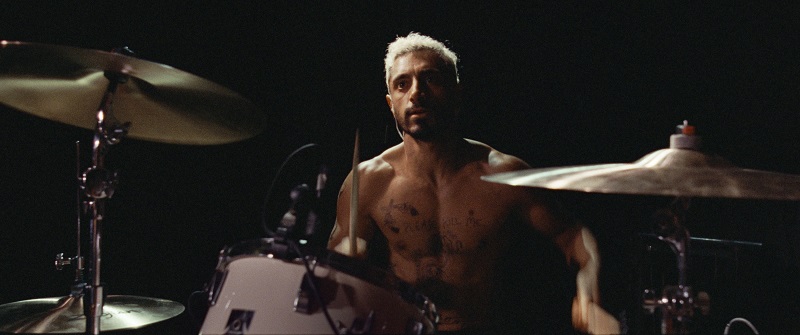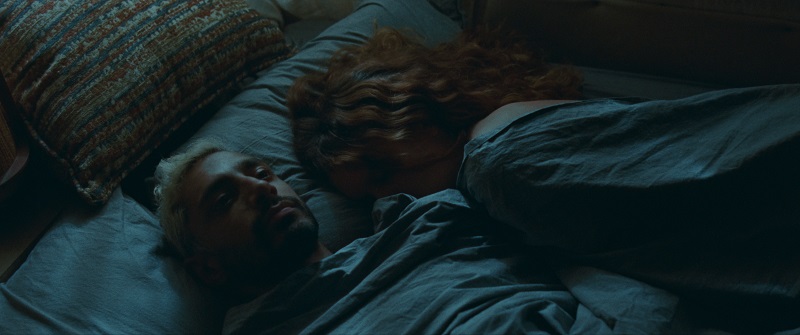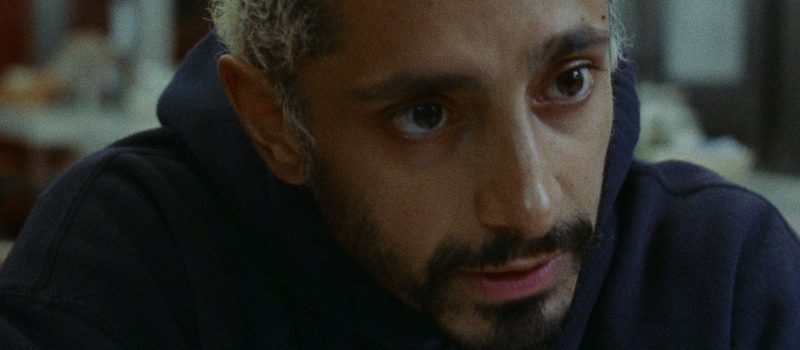Above all else, Sound of Metal features lead actor Riz Ahmed giving one of the performances of the year. His brilliance will undoubtedly find him earning a Best Actor Oscar nomination. Ahmed portrays a hardcore metal drummer who is in a two-person band (a la White Stripes) with his longtime girlfriend, Lou (Olivia Cooke).

Ahmed’s Ruben is an addict and has proudly been clean for four years. He even awakes with the sun, does meditation, yoga, and whips up green smoothies (that even he calls disgusting!) for himself and a still groggy Lou. The pair live in their RV as they traipse across the US, living the dream. In fact, they are in the midst of a tour—moments after the story commences—when everything changes.
Ruben’s sobriety is going to be seriously challenged when his life’s passion catches up with him and hobbles the drummer. One day, the key to his professional and personal adoration—hearing music—is suddenly wiped away. Deafness has reared its head and its seismic effect on the musician’s life is movingly and hauntingly chronicled in Sound of Metal.
Director Darius Marder has made the most impressive of narrative debuts. He co-wrote the script with Abraham Marder, based on a story by Derek Cianfrance. For someone who finds themselves for the first time heading up a production, he hired well. I’ve had helmers who have said that casting and hiring your production team is about 90-percent of the position. That could not be truer with Marder and what his squad has achieved.
Sound design and editing are as much a part of Ruben’s journey as is Ahmed’s tortured, nuanced, and genius turn. The contrast between the first morning in the RV and the next one we experience firmly puts Ruben’s fate into context. From the cracking of the eggshells to the grind of the smoothie maker, the sound is crisp, clear and one could argue—almost a character. When Ruben faces a morning with strained sound, everything is barely audible and one-hundred-percent muddled. The point of view (POV) is usually an element filmmakers employ to put audiences behind the eyes of a character, a visual synchronicity if you will.
Here in Sound of Metal, Marder and his team have given audiences Ruben’s POV from an auditory perspective. It not only heightens the horror, shock, and the life grenade that has just exploded on his personal landscape, but that moviemaking choice has added priceless layers to the emotive tether between the viewer and what is occurring onscreen.
It’s shocking that he returns to the stage after this has occurred. But if one thinks about it, when life hands you shocking news, the tendency is most usually to continue doing what you have been doing. It becomes extraordinarily painful to watch (and hear) when he frantically goes into a pharmacy looking for answers in some random Missouri town and winds up in an Audiologists’ office. He is informed that he barely has around 20-percent of his hearing in each ear. The best way to avoid further hearing loss is to immediately stop being around loud noises. Cue the next scene, you guessed it—Ruben banging on his drums, albeit extremely muffled and one can tell from the blurred image of Lou in the foreground, something is off, and it is no longer able to be hidden.
Lou (smartly) contacts Ruben’s sponsor and a series of connections are set in place because his girlfriend keenly knows that to deal with such an enormous life alteration, an addict is likely to return to what used to pacify his demons—drugs, and alcohol. They arrange to have him go to a rural facility that specializes in deaf addicts and helping them get and stay clean.
Upon arrival, he is met by the man who runs the place, Joe (Paul Raci)—a Vietnam vet who lost his hearing when a bomb went off when he was In Country. He is a dead serious leader who won’t put up with Ruben’s rock star sentiment.

Filmmakers smartly not only showcase the difficultly that is transitioning to being deaf but also being deaf as an addict. Ruben must turn over his phone, the keys to his RV, and say goodbye to Lou, someone who has been by his side every day since he got clean. As portrayed by Cooke and Ahmed, it is heartbreaking and powerfully embodied by two actors firmly living in a moment that transcends this film. Who cannot relate to what these two are experiencing?
On so many levels, Sound of Metal is unlike any other film you’ve experienced. There is the Ahmed factor, which takes a character arc that would be the hardest of hills to climb and makes it a triumph of the human spirit. The man puts on a clinic and warms our collective hearts. The sound design is enriching to not only the narrative but to pulling those heartstrings. Even communicating between two soulmates is now practically impossible due to one of their failing hearing. It also puts a blindingly brilliant spotlight on the deaf community. That aspect provides encouragement to not only Ruben but to us experiencing his journey. These folks not only live with hearing loss, but they are triumphing at life in ways that are utterly inspiring.
How Ruben’s journey will go is always up in the air, at least at the beginning. There is so much anger. There is denial. All the stages of grief are well represented and documented by Marder, but the one at the end is the one that finds the most mystery—acceptance. There is the whole factor that the Audiologist stated about a surgery that can put in implants that “trick” the brain into thinking that it’s hearing when it is not. Ruben has clung to that aspect and the only thing keeping him from undergoing the surgery is cash. Just as we get lost in him leaning into the possibility of “acceptance,” this part of the story returns.

It is that painstaking attention to detail of the human condition that Marder has unconditionally captured with his film. Too often in Hollywood, stories chronicle the roadblocks that come at us in life and the subtle nuances that make or break a person’s commitment to acceptance are not fully flushed out. That is not the case with Sound of Metal. Just when you get comfortable with a story path, Ruben and his journey make a left turn or a U-turn. It is that keep-you-guessing facet of this terrific tale, that not only is relentless in the best of ways—but also keeps it grounded in a reality that most of the masses can not only identify but embody.
None of our lives are straight lines. It is about time that a film that chronicles the undeniable rocky road that a professional musician would face should they lose their hearing not see the protagonist’s journey as black or white. There’s a whole lot of grey there, and a whole lot of nuanced colors—many are refreshingly unforeseen at the outset.
Ahmed will break your heart but in the best of ways. I am firmly a believer in two life ideals—everything happens for a reason and the universe never gives you more than you can handle. Witnessing what the actor achieves with Ruben is beyond blissful. There are raw realities that countless actors have created with their gifts. But it takes a special talent to make them feel not only “real,” but simultaneously mysterious and organic. That is Ahmed and just one of a myriad of reasons why he will become an Oscar nominee.
Cooke has a tough task herself. She is one person when she drops Ruben off at the facility and we get the impression a good chunk of time has passed before the two see each other again. Both change immensely, but still, have that core connection that had them connect at the beginning. The actress’s “heavy lifting” was in that first act. When her life and professional partner was ready to keep rocking and not only embrace denial but have it be their foreseeable immediate future, the onus was on her to make the tough calls, literally and figuratively. Cooke handled all aspects of her characterization stunningly, but none more effectively than when she decides to pull the plug on their tour.

Marder has rich talent in the arena of storytelling. It is the director that not only goes that extra mile to enhance his tale with the unspoken aspects that enrich any film—sound editing, sound effects, lighting, close-ups, cinematography, and score—but can put his audience in the shoes of the protagonist in such a way that their pain is our cross to bear. Sound of Metal viscerally works wholeheartedly because of that fact.
Grade: A

